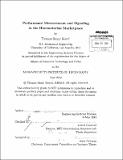Performance measurement and signaling in the humanitarian marketplace
Author(s)
Marcil, Thomas Henry
DownloadFull printable version (12.60Mb)
Other Contributors
Massachusetts Institute of Technology. Engineering Systems Division.
Advisor
Jarrod Goentzel.
Terms of use
Metadata
Show full item recordAbstract
This thesis considers ways in which humanitarian organizations can evaluate their performance internally, signal their performance to others, and what this might mean for the humanitarian relief community as a whole. Part I demonstrates an approach by which humanitarian organizations can develop key performance indicators (KPIs) to measure the performance of their logistics and supply chain activities, using a nonprofit specializing in the provision of medical relief as a case study. This thesis argues that a system of KPIs developed and analyzed by the organization can help improve operational performance, establish goals, and guide strategy. Part II then examines high-level organizational trends in the United States international relief sector, and questions whether contemporary literature on such trends find support in data from the Internal Revenue Service (IRS). This thesis argues that the humanitarian "market" today exists in a newly competitive state defined by this paper as "response-leadership." The humanitarian sector thus mirrors concentrated for-profit markets that embody the price-leadership model. This thesis finally suggests governmental and institutional policies concerning performance measurement that, given the competitive nature of the humanitarian marketplace defined in Part II, may improve market mechanisms in this sector.
Description
Thesis (S.M. in Technology and Policy)--Massachusetts Institute of Technology, Engineering Systems Division, 2013. Cataloged from PDF version of thesis. Includes bibliographical references (p. 191-198).
Date issued
2013Department
Massachusetts Institute of Technology. Engineering Systems DivisionPublisher
Massachusetts Institute of Technology
Keywords
Engineering Systems Division.